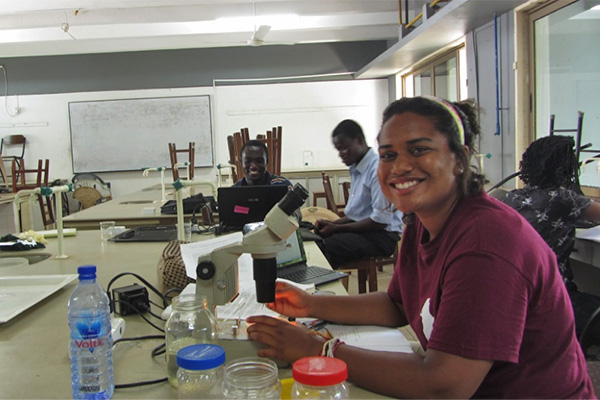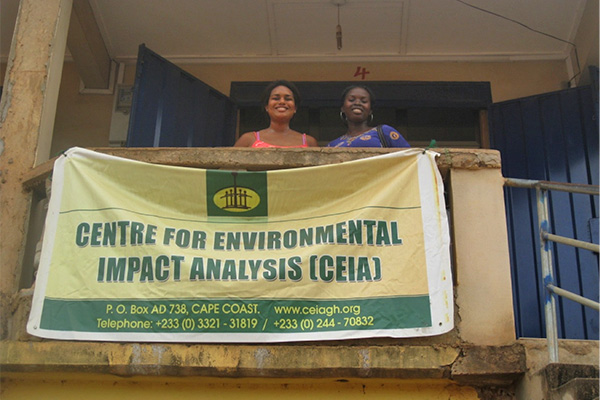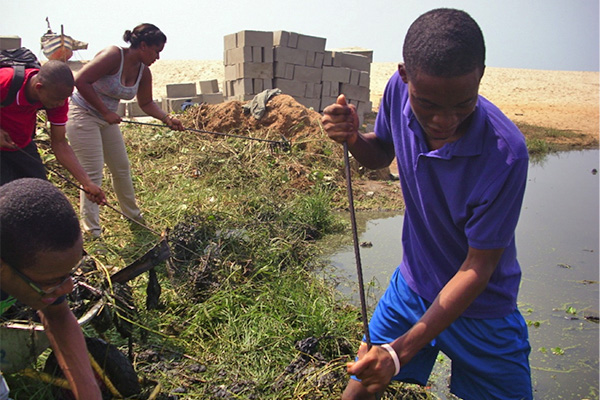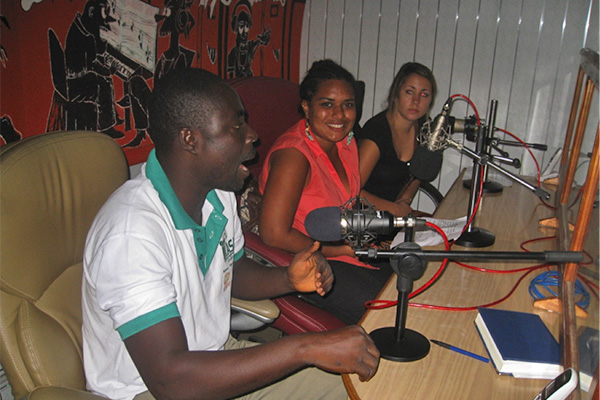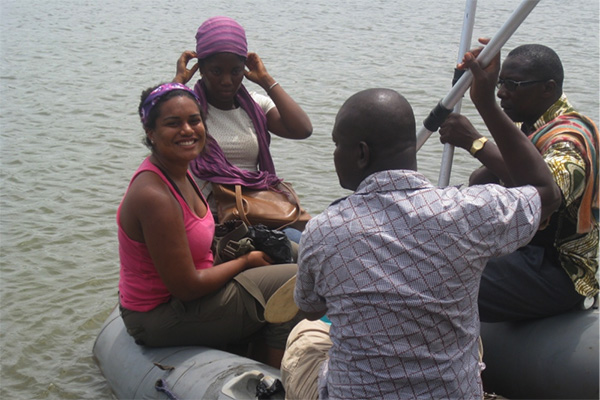Water quality
UD's Allen travels to Ghana to conduct research, educate on water quality
10:21 a.m., April 22, 2013--As a wildlife conservation major, when University of Delaware student Melanie Allen got to travel to Ghana this past summer to conduct research, she was not expecting to be assigned to a project that looked at water quality.
“When I first got assigned to this project I was like, ‘What am I doing? I want to work with butterflies,’” said Allen, a senior studying wildlife conservation in the Department of Entomology and Wildlife Ecology in UD’s College of Agriculture and Natural Resources.
Global Stories
Fulbright awards
Peace Corps plans
It turns out, however, that the project enriched her in ways she never would have experienced had she not stepped out of her comfort zone.
Allen first went to Ghana in the summer of 2012 to conduct water quality research on polluted lagoons in Cape Coast, located in the central region of the country, through a Research Experience for Undergraduates (REU) program at Virginia Tech.
After receiving an Honors Enrichment Award through the UD Honors Program (UDHP), she went back during Winter Session to learn more about the challenges to conservation facing developing countries. This involved educating the locals and making sure that they knew about the dangers of polluting, and the risks involved with eating fish found in the water supply.
During her first trip to the region last summer, Allen said that she realized the need to go back to the country because she was “doing water quality research in lagoons that are used for human consumption” and recognized a lack of communication between the people studying the high levels of pollution in the lagoon and the villagers who were using the lagoon on a daily basis.
Allen said it was clear that the people using the lagoon “weren’t really being informed of what was going on, why they shouldn’t pollute, why it’s dangerous for them to consume water or any fish from there.”
She wondered, “What’s the point of this if we’re just going to publish this paper and there’s not going to be any kind of implementation? That’s why I wanted to go back and work with a local organization that’s directly involved in those lagoons doing environmental education and public awareness activities.”
Working with the Center for Environmental Impact Analysis, a new and small nongovernmental organization (NGO), as its first international volunteer, Allen had two main tasks. The first involved creating a curriculum and engaging students from five middle schools in learning about pollution.
“One of [the center’s] goals is to inform the youth about all of these issues since they’re going to be the future leaders, so they established these environmental clubs in five different junior high schools two years ago,” said Allen.
She devised a curriculum for the students — one that she is still tweaking now that she is back in the United States — with chapters that provide overviews on different topics such as water pollution, climate change and waste management.
Allen explained that the chapters also had questions for the students and group activities that they could do, as well as “take home” messages so they could try to spread their knowledge to the older members of their families.
Allen also worked on a community cleanup at one of the lagoons that she had been studying on her previous trip to Ghana.
Instead of simply having a community cleanup, however, Allen used the opportunity to engage people who had different stakes in the lagoon, such as the local fisherman and the local waste management company that donated supplies to the cleanup.
Allen said that though they were trying to clean up the lagoon, the real purpose was to educate residents about the risks involved in pollution, as the water in the lagoon is probably too polluted for healthy use at this time. “There’s a hospital a couple of blocks away that dumps all their medical waste in there,” said Allen, “and all of the runoff from the street goes in there, so it was just more of a raising awareness activity, bringing everyone together and informing the public.”
Tying in her first project with her second, Allen also brought in two professors who had conducted research on the lagoon to speak with the locals. “They gave a presentation, releasing all of their data on what they found in the lagoon,” said Allen. “It really was this holistic approach to community development so that was really exciting for me to work with people that I worked with over the summer but in a different manner.”
After her experience in Ghana, Allen said that she is no longer looking at master’s programs that deal solely with wildlife conservation, but rather programs that incorporate both of her interests. “I’m looking at master’s programs that integrate the two -- like sustainable development, human environment interactions, conservation biology -- so I definitely want to do something where it involves international development with a focus on conservation. The trip really has shaped my future career goals completely.”
Article by Adam Thomas






